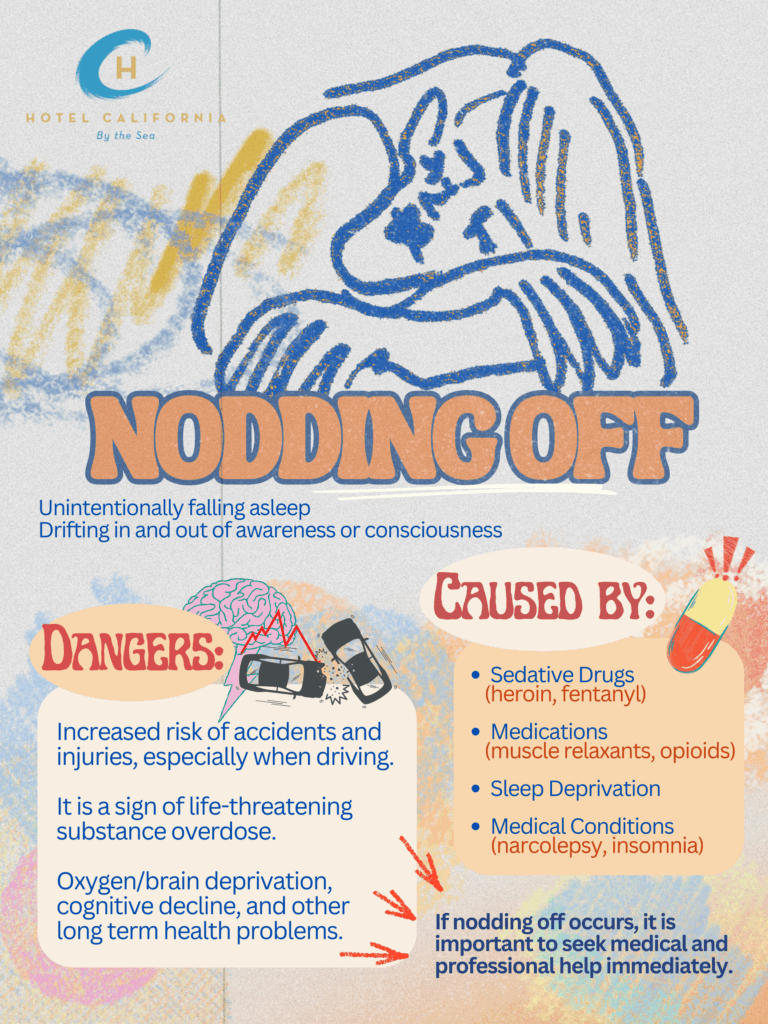What is Nodding Off?
Nodding off or nodding out is a term used to describe a person going in and out of consciousness after misusing sedative drugs like opioids. It occurs during drug use when users have consumed high doses of depressants. It is a reaction in the body when it is struggling to cope with the potent effects and their impact on the executive functioning system. In some cases, nodding off can be a precursor warning to the potential for an overdose risk.

Nodding off can appear harmless at first. It may look like a person has just fallen asleep or looks very fatigued. But this is a dangerous sign of drug abuse. This is because the drug sedates the central nervous system to the point where some executive functions are impaired. The effects of the depressants like opioids or benzos can make it more difficult for the body and mind to stay alert, awake and conscious.
Nodding off is a sign of addiction. The constant use of substances like depressant drugs can cause tolerance, dependence and addiction.
How does nodding off happen?
Nodding off happens when a user consumes a very high dose of a depressant drug. The dose is big enough that it can induce feelings of drowsiness or partial loss of consciousness without causing the person to faint or lose consciousness completely.
Nodding off occurs when the molecules bind to the receptors in the brain. It floods the brain with a sense of pain relief. When high levels of opioids flood the brain, it shuts down the system responsible for pain, anxiety and basic survival functions like breathing. It basically temporarily shuts down the brain and body.
Nodding off is the process of when the brain lets go after being chemically suppressed. It pulls the plug on some of the body’s vital life systems and can put you at risk of the brain completely shutting down.
What does it look like when a person is nodding off?
When nodding off, it can occur at any time and any place after drug use. This person is going in between the state of wakefulness and deep drowsiness. It can also be described as a semi-conscious state of being. In some cases, it may look like a person is peacefully sleeping. In other cases, the person may be slumped over, their eyes are rolled back with their mouths open. They may suddenly wake up again, only to nod back out of consciousness.
The person may be sitting straight up when nodding off. They may also be in the middle of a conversation when they begin to fall out of consciousness. In some extreme cases, they may be standing or in the middle of walking and then start nodding off. When this occurs, the sedative effects begin to take over the physical body and can occur at almost any time after drug use.
When a person is nodding off, they can still respond to noises or physical stimuli. However, they will continue to return to a state of semi-consciousness.

What types of drugs cause a person to nod off?
Any substance that is a central nervous system depressant can cause nodding off. Opioids, prescription pain killers, and other sedative drugs impact the central nervous system. These drugs suppress pain and enhance feelings of pleasure in high doses. These effects can cause a dangerous state of consciousness, also known as nodding off.
The substances that cause people to nod off are central nervous system depressants. Opioids such as heroin, fentanyl, Percocet, oxycodone, oxymorphone, hydrocodone, tramadol and methadone are sedative drugs that can cause nodding off. Other drugs like alcohol, Dilaudid, buprenorphine and other benzodiazepines are also sedatives that can cause a person to nod off.
Benzos are sedative prescription drugs that boost the GABA neurotransmitter in the brain. This inhibitory chemical slows down brain activity and slows down messaging systems between nerve cells. Benzos increase serotonin levels in the brain, which also contributes to mood and sleep. Altogether, it causes sedation and calmness, leading the person to feel fatigued, tired, and sleepy.
When you combine two or more opioids or depressant drugs, there is also a higher risk of nodding off. Combinations such as alcohol and opioids, xylazine and fentanyl, benzo and opioids and antidepressants and opioids are common drug pairings that can cause nodding off. Nodding off can also occur in those who mix opioids with cocaine or methamphetamines.
In 2022, researchers found that an estimated 11,000 overdose deaths involved benzos and opioids. An estimated 5,000 overdose deaths involved antidepressants and opioids. These are both common drug combinations known to cause nodding off.
What are the dangers of nodding off?
- Respiratory failure – Opioids suppress breathing and can stop breathing altogether
- Brain damage – Opioids can cause nodding off to the point where the person may not get enough oxygen flow to the brain
- Injury and accidents – Nodding off while driving or performing a dangerous task can lead to physical injury
- Health problems – Users often inject high doses of sedatives and can share needles, causing other health concerns of contamination
- Overdose – Taking too much or too high a dose can lead to overdose and death
- Loss of healthy relationships
- Development or worsening of mental health conditions
- Loss of employment
- Financial issues
- Legal consequences
- Hormonal deficiencies
- Weakened immune system
- Complications of infections
- Sleep problems
- Tolerance, dependence and addiction
- When nodding out you can fall down stairs, get into a car accident, choke on food
Check Your Insurance Coverage for FREE
Find out if your insurance covers addiction treatment in minutes. We accept most insurance!
Signs someone may be nodding off
- The person may be in an altered state of consciousness. This is the most evident sign. The person could fall asleep mid-conversation and go in and out of being awake and asleep.
- Slowed breathing. Opioids are known to suppress the respiratory system.
- Slurred speech and motor skills. The person may be unable to articulate their words and may have difficulty controlling their arms and limbs.
- Pinpoint pupils
- Lack of responsiveness – When people nod off, they become less responsive to stimuli and sometimes calling their name or attempting to physically wake them might not even elicit a response
- Withdrawing from social interactions – A person may have changes in behavior and withdrawal and isolation from others
- Possession of drugs and drug paraphernalia – You may find the person with drugs or needles on them
Nodding off vs Overdose
Nodding off and overdosing may seem like similar events that occur due to drug use. They both cause slowed breathing, difficulty with staying awake and slurred speech. An overdose is when a person has shallow breathing or stops breathing and their lips and skin turn blue. They may no longer respond to stimuli and their bodies can completely shut down.
When a person is nodding off, they go in and out of consciousness. They are still able to respond to stimuli but can have difficulty staying alert for long periods of time. Nodding off can eventually turn into an overdose if there is too high a drug dose.
Reach out to Hotel California by the Sea
We specialize in treating addiction and other co-occurring disorders, such as PTSD. Our Admissions specialists are available to walk you through the best options for treating your addiction.
Treatment for Substance Use Disorder
The central nervous system is responsible for many life-supporting functions such as functions of vital organs like the lungs and heart. When taking sedative medications, it can suppress the central nervous system causing limitations of breathing and heart functions. When there are high levels of sedatives, it can cause a person to nod off or go in and out of consciousness due to the suppression of executive functions of the lungs, heart and brain.
Early recognition of nodding off can be an important life-saving gesture. If you notice a person nodding off, call 911 immediately.
Professional behavioral health treatment programs such as Hotel California by the Sea provide treatment for opioid use disorder. We provide treatment at all levels of care including detox, residential, PHP and IOP. We utilize evidence-based treatment methods such as CBT, DBT and EMDR therapy. Hotel California by the Sea is dedicated to helping clients reach their goals in sobriety and overcome their addiction.
References:
https://www.addictioncenter.com/addiction/nodding-out
https://www.solutionpointbh.com/blog/dangers-of-nodding-out
https://archstonerecovery.com/rehab-blog/what-causes-people-to-nod-off-on-drugs/
https://trueselfrecovery.com/dangers-of-nodding-off-on-heroin-and-opioids/
https://firststepbh.com/blog/how-can-you-tell-when-someone-is-nodding-off-due-to-drugs/
